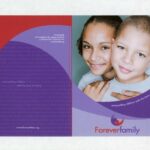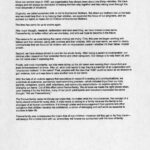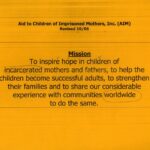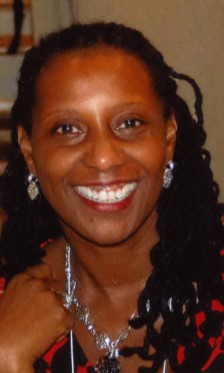Incarcerated Women: Foreverfamily
The non-profit agency Foreverfamily was originally known as “Aid to Children of Imprisoned Mothers” or AIM. In 1987, Sandra Barnhill left her job as a public interest attorney to create AIM, after becoming frustrated by the lack of support given to mothers sentenced to prison and to their children. Later, programming was created to reflect more than just the incarcerated mother but the families and care givers left behind, and the name was changed to reflect all those involved in raising children and the family unit in general. Foreverfamily programming includes child and youth-focused projects, parent education and family support, regularly scheduled prison trips, and a Caregiver Support Initiative.
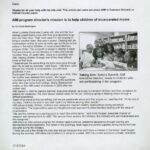
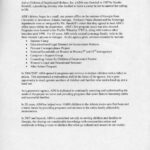


“[On] Saturdays [if] we’re going on a prison trip, I have to open the office at 4:30. Our first bus leaves at 5:45 a.m. So I have to get in there, get breakfast set up, the kids come, and then we get ready. They get on the busses that we use, and the first bus leaves at 5:45 a.m. because we go down to Hawkinsville, Georgia. That’s two and a half hours one way. And then kids stand outside in line to get processed in. You know, you can’t wear shorts; you can’t bring in certain stuff. I’m glad the department does not strip-search our children. You visit in the children’s center, which — we are the pioneers [who] got those started here in Georgia– which is a room with games and toys and rocking chairs and a changing table. Mom can change and interact with her kids. Or you visit in general visitation, which is usually the gym. They’ve put [out] chairs and tables, and you sit around there. You sit there for five hours and the guards watch you. In the children’s center, the [correctional officers] aren’t dressed in their guard uniform. It’s a different atmosphere. At the end, well the mom is strip-searched when she comes down before she sees you, so she’s already gone through that, and she sees you. And then, you leave, and there are all these tears and hugs, and the mom gets strip-searched again, and she goes back to her cell.
You know, and there are many people — well, not so much now as it used to be — who felt like it was wrong to bring the children into a prison environment to see their mom, which is part of why we fought to get the children’s centers, where its more humane. But I’ll tell you my experience, and I’ve worked with over 20,000 children, there is something healing about being with your mom and being close to her, and I don’t care where it is, in a prison, in the middle of the street, in the house. But there is something about the power of that love and that relationship that outweighs whatever physical environment you’re in. Its’ transformative for the kids and for her, and I’ve just seen so many opportunities because I think what happens is, in that place, in that time, kids know, without a shadow of doubt, Mommy didn’t abandon me. She didn’t forget about me, and most importantly, she still loves me. And love is the most powerful and most healing force in this universe. I believe that. I really do.” – Sandra Barnhill, 7 August 2014
